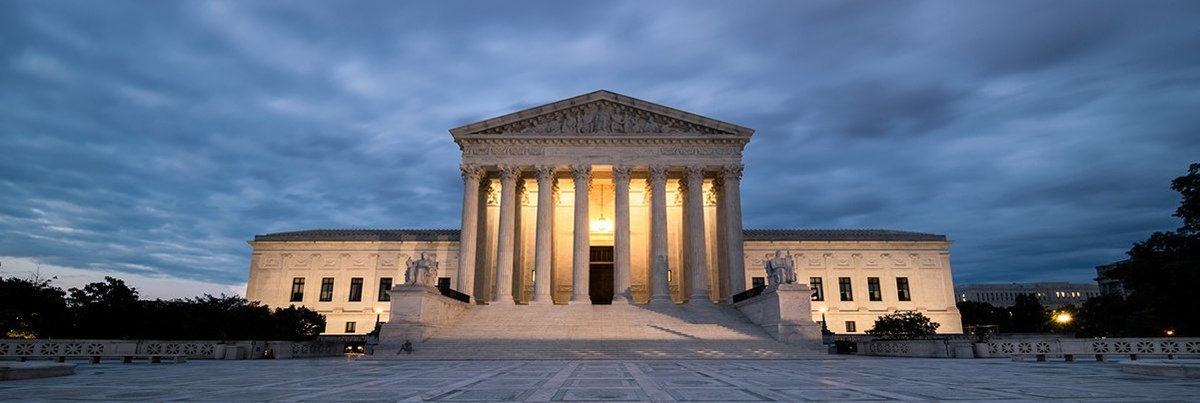A new YouGov survey explores what Americans think of the Supreme Court and its justices. Since a year ago, Republicans have become less likely to view justices favorably, while Democrats and Independents have become less likely to say the Supreme Court has too much power.
45% of Americans strongly or somewhat disapprove of how the Supreme Court is handling its job; 40% strongly or somewhat approve. Republicans (73%) are much more likely than Independents (34%) or Democrats (14%) to approve.
Approval was lower on an Economist/YouGov Poll conducted at around the same time: 35% approved and 51% disapproved.
Sonia Sotomayor leads the rest of the court in net favorability — the share of Americans who view each justice favorably minus the share who view the justice unfavorably. But even she is only narrowly viewed more favorably than unfavorably, with a net favorability of +4. Ketanji Brown Jackson has a net favorability of +2, followed by Elena Kagan (-3) and Samuel Alito (-6). The remaining justices each have net favorability of -8 or -9 among Americans.
Democrats view Sotomayor (+50 net favorability) and Ketanji Brown Jackson (+45) the most favorably. They view Brett Kavanaugh (-60) and Clarence Thomas (-59) the most unfavorably.
Among Republicans, the reverse is true. The justices they view most favorably are Brett Kavanaugh (+46) and Clarence Thomas (+40). The justices Republicans view least favorably are Ketanji Brown Jackson (-42) and Sonia Sotomayor (-41).
Among Democrats, favorability towards justices hasn’t changed significantly since July 2023 polling. The story is different among Republicans: Fewer view each justice favorably now than did in July 2023. Positive sentiment among Republicans has dropped the most for Barrett (59% viewed her favorably in July 2023 and 48% do now) and Thomas (56%, down from 66%). The shares of Republicans with favorable views of Kavanaugh (58%, from 66%) and Gorsuch (46%, from 55%) have also dropped.
About one-quarter (26%) of Americans say the Supreme Court has too much power — a steep decrease from July 2024, when 42% of Americans said this. The decline among Democrats is particularly large: from 73% last year, when a Democrat was president, to 41% in 2025 with a Republican in the White House. Among Independents, 22% say the court has too much power, down from 38% a year ago.
Most (55%) think the Supreme Court has the right amount of power. Republicans are much more likely than Democrats to say this (67% vs. 38%). But only 16% of Democrats said this a year ago.
Americans are far more likely to describe the Supreme Court’s political viewpoint as conservative (23%) or very conservative (24%) than to describe it as liberal (6%) or very liberal (3%). 29% of Americans — including 44% of Republicans and 16% of Democrats — describe the court’s political viewpoint as moderate.
In July 2023, a slightly larger share of Republicans described the court as conservative (38%).
42% of Americans think the Supreme Court is more conservative than the American public. 72% of Democrats and 18% of Republicans share this view. Fewer Americans say that the Supreme Court is about in line with the American public ideologically (24%) or more liberal than the public (12%).
About two-thirds (68%) of Americans say the statement “The current U.S. Supreme Court justices often let their own personal or political views influence their decisions” comes closer to their view than “The current U.S. Supreme Court justices usually decide their cases based on legal analysis without regard to their own personal or political views” (32% say this is closer to their view).
Americans are less likely now than they were in 2023 to say the statement suggesting justices usually decide their cases based on legal analysis without regard to their own views is closer to their opinion (32% now, down from 40%).
There is widespread support for the idea of instituting term limits for Supreme Court justices. Among Americans, the net support, or the percentage of Americans who support this idea minus the percentage who oppose it, is +56. Democrats (+76) and Republicans (+38) are more likely to support than oppose this idea. Americans also are highly supportive of enforcing an ethical code for Supreme Court justices (+68).
Among the largest gaps between Democrats and Republicans: Democrats give the idea of expanding the size of the Supreme Court net support of +29, while Republicans are at -51. Democrats are also more supportive of requiring the Supreme Court to have an even number of judges, half of them Democrats and half Republicans (+45 vs. -7).
12% of Americans think the maximum number of years a Supreme Court justice should be allowed to serve is four or less. 14% think the limit should be between five and nine years and 19% say it should be between 10 and 14 years. 56% of Democrats and 40% of Republicans support a limit of less than 15 years.
Majorities of Americans agree that the Supreme Court gets too mixed up in politics (67%) and that the decisions of the Supreme Court favor some groups more (65%). Half (50%) agree that the Supreme Court should be able to throw out any law it considers unconstitutional; 29% disagree with this.
Americans are evenly split on whether the justices on the Supreme Court make decisions based on objective interpretations of the law, rather than personal opinions: 40% agree and 42% disagree. There is a similar divide about whether the Supreme Court can usually be trusted to make decisions that reflect the views of most Americans: 39% agree that it can and 41% disagree.
Among the biggest differences between Democrats and Republicans, in their agreement with seven claims about the Supreme Court: 55% of Democrats and 13% of Republicans agree the current conservative majority on the Supreme Court is not legitimate. 25% of Democrats and 55% of Republicans agree that the Supreme Court can usually be trusted to make decisions that reflect the views of most Americans.
Related:
- Most Americans support term limits and an ethics code for the Supreme Court
- Americans say many Trump tactics cross the line for presidents
- Reflections on the Supreme Court’s 2024 rulings: What do Americans think?
See the results for this YouGov survey
— Carl Bialik and Taylor Orth contributed to this article
Methodology: This article includes results from an online survey conducted June 30 - July 2, 2025 among 1,043 U.S. adult citizens. Respondents were selected from YouGov’s opt-in panel to be representative of adult U.S. citizens. The sample was weighted according to gender, age, race, education, 2024 presidential vote, 2020 election turnout and presidential vote, baseline party identification, and current voter registration status. 2024 presidential vote, at time of weighting, was estimated to be 48% Harris and 50% Trump. Demographic weighting targets come from the 2019 American Community Survey. Baseline party identification is the respondent’s most recent answer given around November 8, 2024, and is weighted to the estimated distribution at that time (31% Democratic, 32% Republican). The margin of error for the overall sample is approximately 4%.
Image: Getty
What do you really think about President Trump, American politics in general, and everything else? Share your reality, join the YouGov panel, and get paid to share your thoughts. Sign up here.


















